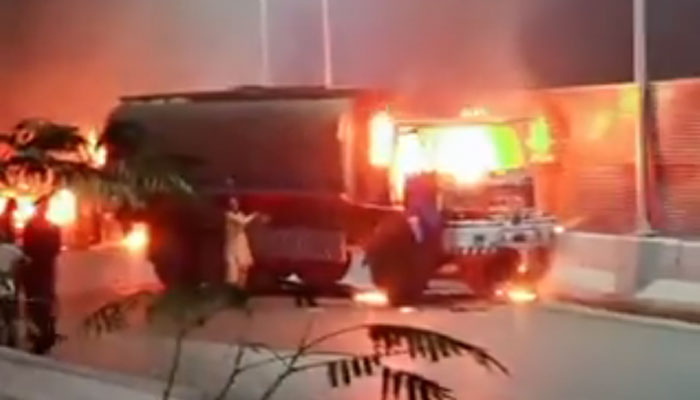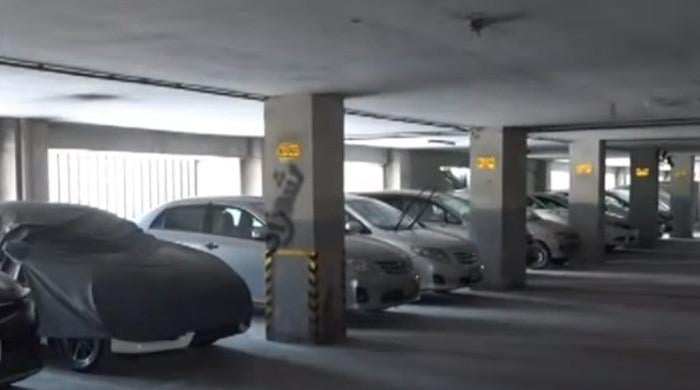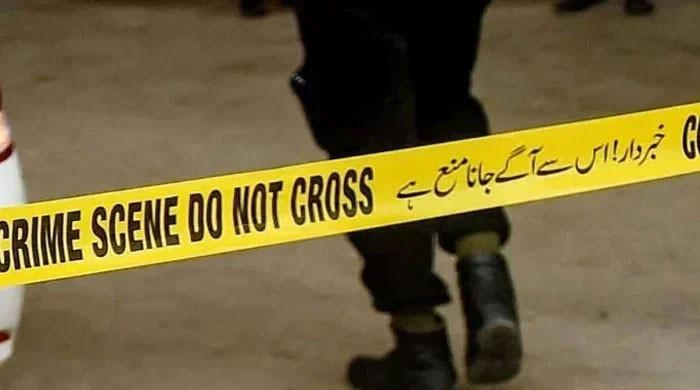Five trucks torched after reckless heavy vehicle race claims another life in Karachi
Sindh home minister stresses need for stricter enforcement of traffic laws and measures to prevent tragedies
February 18, 2025

- Drivers of water tankers were engaged in race: police.
- Sindh home minister takes notice of biker's death.
- Directs police to submit report on incident, violence.
KARACHI: The metropolis witnessed tensions late Monday night when a motorcyclist lost his life after being hit by a speeding water tanker near Jail Chowrangi, once again bringing road safety concerns in the metropolis into the spotlight.
The accident triggered public outrage as enraged citizens set five water tankers on fire near the crash site in the port city. However, firefighters responded promptly, extinguishing the flames and preventing further damage.
Taking immediate notice of the escalating situation, Sindh Home Minister Ziaul Hassan Lanjar directed police officials to submit a detailed report on the accident and the ensuing violence.
The minister also emphasised the need for stricter enforcement of traffic laws and measures to prevent such tragedies in the future.
The tragic incident comes amid a worrying rise in traffic-related fatalities in the sprawling city. Over the past two months alone, at least 100 people have died in road accidents across the city.
Of these fatalities, 72 occurred in urban areas and 24 in the suburbs. At least eight lives were lost in four separate accidents involving dumpers.
In response to the alarming increase in casualties caused by heavy vehicles, the Sindh government imposed a ban earlier this month on their entry into the city during daytime. As per provincial directives, dumpers are now only allowed to enter Karachi between 10pm and 6am.
Monday's tragedy has reignited calls for stricter road safety measures and better enforcement of traffic regulations to curb the rising number of accidents in the city.
Authorities are under increasing pressure to address these concerns and ensure the safety of Karachi's residents.
Govt's response
Following a series of dumper truck-related fatalities earlier this month, Sindh’s Senior Minister Sharjeel Inam Memon addressed the media on February 13 regarding measures taken by the provincial government to curb the rising number of road accidents.
The Sindh government has mandated the fitness and registration of all heavy transport vehicles. Moving forward, all large transport vehicles must possess a valid fitness certificate to operate on the roads. Vehicles lacking proper certification will be prohibited from use.
Memon stated that the water board has also implemented a barcode system for all registered water tankers operating from authorised hydrants. Only vehicles that meet the required fitness standards will be issued barcodes, while unregistered vehicles will be seized.
Additionally, previously registered vehicles will undergo re-evaluation to ensure continued compliance with safety regulations.
A 30-day grace period has been granted for heavy transport vehicles to obtain fitness certificates.
Furthermore, the operational hours for dumper trucks in Karachi have been revised. Previously permitted on roads from 11pm to 6 pm, dumpers will now only be allowed between 10pm and 6am to ease congestion and enhance public safety.
Speaking later the same day on Geo News’ program Geo Pakistan, Memon stated that it is incorrect to place blame solely on a single person or institution for road mishaps.
He emphasised that responsibility falls on all stakeholders, including the government, reckless drivers, and those who violate traffic laws.
He further noted that vehicle fitness requirements are not new and that the government is planning to outsource the transport department.
“Accidents should not be politicised”
Speaking at the show “Geo Pakistan”, Sindh Government Spokesperson Sadia Javed emphasised that the authorities are taking precautions to counter the tanker-related accidents.
However, in response to this accident, she strongly said that this issue should not be politicised and accidents should be treated like accidents.
“Political forces should not give this [issue] an ethnic colour,” she said.
When questioned about Muhajir Qaumi Movement (Haqiqi) (MQM-H) leader Afaq Ahmed’s statement, she added: “Afaq Ahmed gave a statement and the government took action as it will not let any law and order situation to be created.”
She further said that the public should also act patiently and cooperate with the government in enforcement of the safety measures.












